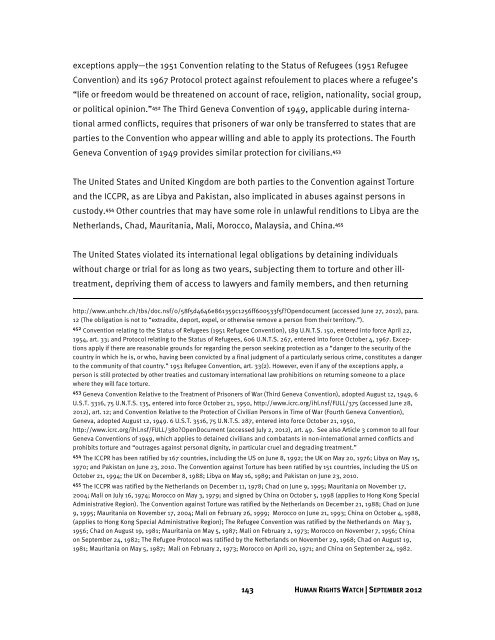Delivered Into Enemy Hands - Human Rights Watch
Delivered Into Enemy Hands - Human Rights Watch
Delivered Into Enemy Hands - Human Rights Watch
You also want an ePaper? Increase the reach of your titles
YUMPU automatically turns print PDFs into web optimized ePapers that Google loves.
exceptions apply—the 1951 Convention relating to the Status of Refugees (1951 Refugee<br />
Convention) and its 1967 Protocol protect against refoulement to places where a refugee’s<br />
“life or freedom would be threatened on account of race, religion, nationality, social group,<br />
or political opinion.” 452 The Third Geneva Convention of 1949, applicable during interna-<br />
tional armed conflicts, requires that prisoners of war only be transferred to states that are<br />
parties to the Convention who appear willing and able to apply its protections. The Fourth<br />
Geneva Convention of 1949 provides similar protection for civilians. 453<br />
The United States and United Kingdom are both parties to the Convention against Torture<br />
and the ICCPR, as are Libya and Pakistan, also implicated in abuses against persons in<br />
custody. 454 Other countries that may have some role in unlawful renditions to Libya are the<br />
Netherlands, Chad, Mauritania, Mali, Morocco, Malaysia, and China. 455<br />
The United States violated its international legal obligations by detaining individuals<br />
without charge or trial for as long as two years, subjecting them to torture and other illtreatment,<br />
depriving them of access to lawyers and family members, and then returning<br />
http://www.unhchr.ch/tbs/doc.nsf/0/58f5d4646e861359c1256ff600533f5f?Opendocument (accessed June 27, 2012), para.<br />
12 (The obligation is not to “extradite, deport, expel, or otherwise remove a person from their territory.”).<br />
452 Convention relating to the Status of Refugees (1951 Refugee Convention), 189 U.N.T.S. 150, entered into force April 22,<br />
1954, art. 33; and Protocol relating to the Status of Refugees, 606 U.N.T.S. 267, entered into force October 4, 1967. Exceptions<br />
apply if there are reasonable grounds for regarding the person seeking protection as a “danger to the security of the<br />
country in which he is, or who, having been convicted by a final judgment of a particularly serious crime, constitutes a danger<br />
to the community of that country.” 1951 Refugee Convention, art. 33(2). However, even if any of the exceptions apply, a<br />
person is still protected by other treaties and customary international law prohibitions on returning someone to a place<br />
where they will face torture.<br />
453 Geneva Convention Relative to the Treatment of Prisoners of War (Third Geneva Convention), adopted August 12, 1949, 6<br />
U.S.T. 3316, 75 U.N.T.S. 135, entered into force October 21, 1950, http://www.icrc.org/ihl.nsf/FULL/375 (accessed June 28,<br />
2012), art. 12; and Convention Relative to the Protection of Civilian Persons in Time of War (Fourth Geneva Convention),<br />
Geneva, adopted August 12, 1949. 6 U.S.T. 3516, 75 U.N.T.S. 287, entered into force October 21, 1950,<br />
http://www.icrc.org/ihl.nsf/FULL/380?OpenDocument (accessed July 2, 2012), art. 49. See also Article 3 common to all four<br />
Geneva Conventions of 1949, which applies to detained civilians and combatants in non-international armed conflicts and<br />
prohibits torture and “outrages against personal dignity, in particular cruel and degrading treatment.”<br />
454 The ICCPR has been ratified by 167 countries, including the US on June 8, 1992; the UK on May 20, 1976; Libya on May 15,<br />
1970; and Pakistan on June 23, 2010. The Convention against Torture has been ratified by 151 countries, including the US on<br />
October 21, 1994; the UK on December 8, 1988; Libya on May 16, 1989; and Pakistan on June 23, 2010.<br />
455 The ICCPR was ratified by the Netherlands on December 11, 1978; Chad on June 9, 1995; Mauritania on November 17,<br />
2004; Mali on July 16, 1974; Morocco on May 3, 1979; and signed by China on October 5, 1998 (applies to Hong Kong Special<br />
Administrative Region). The Convention against Torture was ratified by the Netherlands on December 21, 1988; Chad on June<br />
9, 1995; Mauritania on November 17, 2004; Mali on February 26, 1999; Morocco on June 21, 1993; China on October 4, 1988,<br />
(applies to Hong Kong Special Administrative Region); The Refugee Convention was ratified by the Netherlands on May 3,<br />
1956; Chad on August 19, 1981; Mauritania on May 5, 1987; Mali on February 2, 1973; Morocco on November 7, 1956; China<br />
on September 24, 1982; The Refugee Protocol was ratified by the Netherlands on November 29, 1968; Chad on August 19,<br />
1981; Mauritania on May 5, 1987; Mali on February 2, 1973; Morocco on April 20, 1971; and China on September 24, 1982.<br />
143 HUMAN RIGHTS WATCH | SEPTEMBER 2012
















